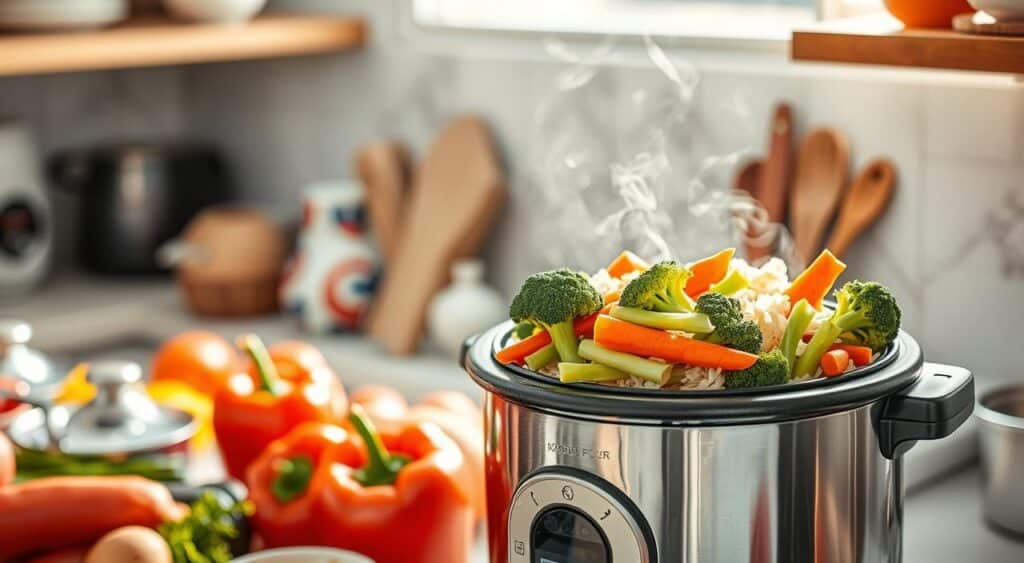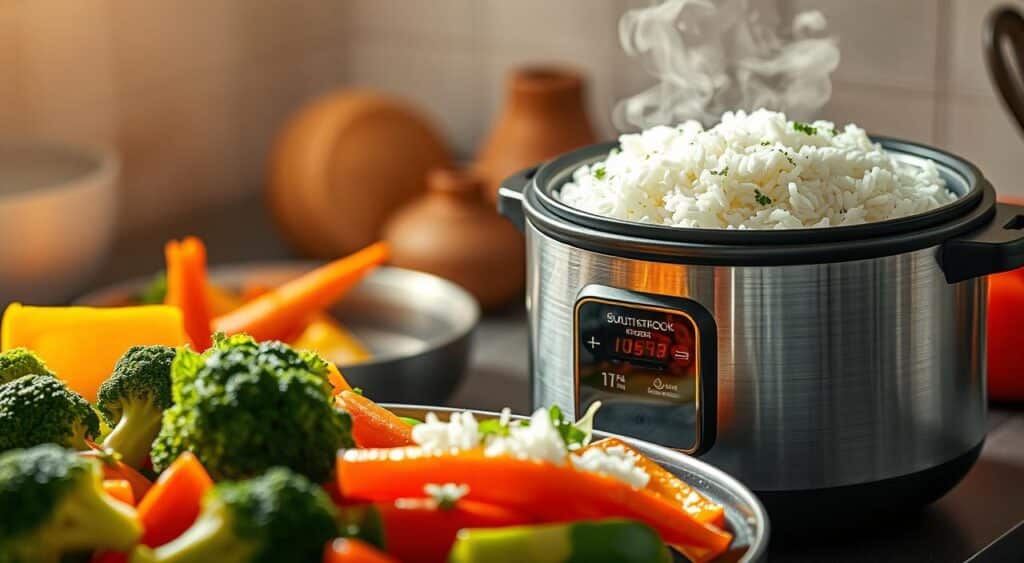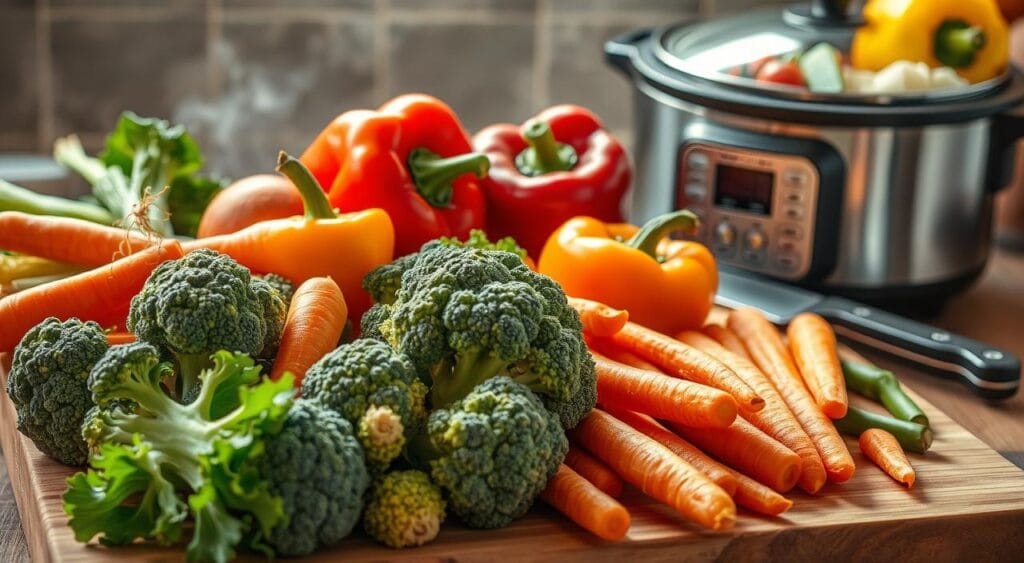Jump to:
Estimated reading time: 11 minutes
Table of contents
Can you steam vegetables in a rice cooker while cooking rice? Yes, you can! A rice cooker is not just for rice; it’s also great for steaming veggies. This method is perfect for busy cooks who want to make a meal in one pot. It saves time and space in the kitchen.
By using a rice cooker, you can cook rice and veggies together. This keeps the nutrients and flavors of both intact. Many rice cookers come with a steaming basket. This makes it easy to prepare one-pot rice and veggies dishes quickly.
Steaming veggies in a rice cooker makes your meals taste better and more nutritious. It’s a quick way to cook, especially when you’re short on time. A rice cooker is a key tool in the kitchen. It helps you make a balanced meal with protein, rice, and veggies, all with little effort.
Can you steam vegetables in a rice cooker while cooking rice? Key Takeaways
- Rice cookers are versatile tools for cooking rice and vegetables simultaneously.
- Steaming in a rice cooker helps retain nutrients and flavors.
- The one-pot cooking method can be done in about 35 minutes.
- Layering ingredients above the rice enhances cooking efficiency.
- Choosing appropriate vegetables is crucial for optimal steaming times.
Introduction
In today’s fast world, making healthy meals quickly is key. A rice cooker is a great way for busy people to save time. It helps make nutritious meals with little cleanup.
Most veggies cook well in a rice cooker, taking 20-30 minutes to cook. This way, you get tasty veggies and perfectly cooked rice. Just add 1/4 to 1/2 cup of water to prevent sticking.
This cooking method is perfect for those who want quick, healthy meals. Different veggies cook at different times. Root veggies like potatoes or carrots might need boiling first.
Using the rice cooker’s “Steam” or “Vegetable” setting makes cooking easier. It helps you make balanced meals without losing flavor or nutrition. Ready to learn more about using your rice cooker? Let’s dive into the next section!

Why Steam Vegetables in a Rice Cooker?
Using a rice cooker to steam vegetables is super convenient. It makes cooking both rice and veggies at once easy. This way, you save time and effort.
Can you steam vegetables in a rice cooker while cooking rice? Convenience of Cooking Rice and Vegetables Together
Cooking rice and veggies together in a rice cooker is a breeze. Models like the Hamilton Beach Rice Cooker have a steamer basket. It fits over the rice, making one-pot meal preparation a snap. You don’t need extra pots or pans.
Can you steam vegetables in a rice cooker while cooking rice? Nutritional Benefits of Steaming Vegetables
Steaming veggies keeps more nutrients than boiling. For example, steamed broccoli is low in calories but packed with vitamins and minerals. This method is healthier for your meals.
Can you steam vegetables in a rice cooker while cooking rice? Saving Time with a One-Pot Meal
Preparing a one-pot meal is great for busy families. Steaming veggies in a rice cooker saves time and reduces cleanup. You can make a meal in under 30 minutes. Even broccoli steams in just three minutes.

Adding this method to your cooking routine means healthier meals with less cleanup. For more tips on using your rice cooker, check out this great resource.
How to Steam Vegetables in a Rice Cooker
Steaming veggies in a rice cooker is easy. Just follow a few simple steps. This way, you can cook your veggies while your rice cooks, making a complete meal.
Step 1: Preparing the Vegetables
Begin by washing and cutting your veggies into equal pieces. This ensures they cook evenly. Good choices include broccoli, French beans, and carrots. For the best results, use:
- 2 carrots
- 10 baby corn
- ¾ cup sweet corn
- ½ cup green peas
- 250 grams mushrooms
- Cauliflower (quantity as desired)
Step 2: Measuring the Rice and Water
It’s important to measure rice and water correctly. For the Aroma rice cooker, use 1 cup of rice to 2 cups of water. You’ll need about 4 cups of water for this recipe. This helps prevent overflow and ensures the best taste.
Step 3: Placing the Vegetables in the Steaming Basket
Put your veggies in the steaming basket on top of the rice cooker. Place it halfway through the rice cooking time. This way, your veggies will be done when the rice is ready. Always use oven mitts when handling the hot steam.

Choosing the Right Vegetables for Steaming in a Rice Cooker
Steaming vegetables in a rice cooker is a great way to make healthy meals. Not all veggies are the same for steaming. Pick the right ones for the best taste and texture. Choose from quick-cooking, denser, and leafy greens to make a balanced meal.
Quick-Cooking Vegetables: Broccoli, Carrots, and Peas
Broccoli, carrots, and peas are perfect for steaming. They cook in 5–7 minutes, staying tender and adding color and nutrients. These veggies make your meal look good and healthy.
Dense Vegetables: Potatoes, Sweet Potatoes, and Beets
Potatoes, sweet potatoes, and beets need to be cut small for steaming. They take 10-15 minutes to cook. Their density adds health benefits and makes your meal satisfying.
Leafy Greens: Spinach, Kale, and Bok Choy
Leafy greens like spinach, kale, and bok choy are great for steaming. They cook fast and add flavor to your rice. They’re also packed with health benefits.
For tips on steaming veggies in a rice cooker, see this guide on steaming with rice cookers. Try an easy chicken and gravy dish for a tasty pairing with your steamed veggies.
Adjusting Cooking Times for Rice and Vegetables
Getting the timing right for rice and vegetables can make your meal better. Knowing the rice cooking times is key, as different types of rice need different times. White rice cooks faster than brown, so you need to adjust the cooking time.
Balancing Cooking Time for Different Types of Rice
Each type of rice cooks differently. White rice cooks in about 20-30 minutes. Brown rice takes longer, around 40-50 minutes, because it’s denser.
If you’re trying basmati or jasmine rice, you’ll need to adjust the cooking time and water ratio. A good rule is to use a 1:2 ratio of rice to water for the best results.
How to Avoid Overcooking or Undercooking Vegetables
Overcooked vegetables lose their color and nutrients, making them less appealing. Timing is key to avoid this. Vegetables usually need 5-15 minutes of steaming.
Start steaming vegetables halfway through cooking the rice. This way, both will be ready at the same time. This method helps prevent overcooked vegetables that can ruin your meal.
Tips for Maintaining Vegetable Texture
To keep vegetables tender-crisp and flavorful, don’t overcrowd the steaming basket. This can cause uneven cooking. Try not to lift the lid too much during steaming, as it can disrupt the heat and steam.
Adding a bit more steaming time after the rice is done can also improve the vegetables. This makes for a more enjoyable meal.
If you’re looking for easy dessert ideas, try using simple ingredients in creative ways. Learn more about making desserts easy and fun by visiting this link.
Enhancing Flavor When Steaming Vegetables with Rice
Steaming vegetables with rice can make your meal taste better. Adding different ingredients can make the flavors richer. This makes the taste of steamed veggies more enjoyable.
Using Herbs, Spices, and Seasonings
Adding herbs, spices, and seasonings can really boost the flavor. Try using rosemary, thyme, garlic powder, or onion powder. These add a special taste to your veggies.
They let the natural taste of the veggies shine. At the same time, they make the flavors more interesting. This makes your meal smell and taste amazing.
Adding Broth Instead of Water for Extra Flavor
Using broth instead of water can make your dish taste more savory. Choose vegetable or chicken broth for a richer flavor. This simple change makes your rice and veggies taste better.
It adds a depth of flavor that water can’t match. Your meal will be more satisfying and flavorful.
Incorporating Oil or Butter for a Richer Taste
Adding oil or butter can also enhance your dish. Use them during or after cooking. This adds a creamy texture and boosts the taste.
Olive oil or seasoned butter can make your veggies taste great. It’s a tasty addition to your meal.
These tips can make your steamed veggies taste amazing. They pair well with rice, making a delicious meal. Want to learn more about cooking? Check out cookie dough versus batter.
Best Rice Cooker Settings for Steaming Vegetables
Rice cookers have different settings that make steaming vegetables and cooking rice better. The right setting can improve texture and flavor. It also makes meal prep more efficient. Here are some tips for the best rice cooker steam setting, 9.
Using the “Steam” Function if Available
If your rice cooker has a “steam” function, use it. It’s made for steaming, with perfect temperatures and times. This setting helps keep nutrients and flavors in your food, making it more enjoyable.
How to Use the Basic Cooking Setting for Steaming Vegetables
If your rice cooker doesn’t have a steam function, the basic setting works well. Start by measuring the right amount of water for your rice. For long-grain white rice, use 1 cup of rice to 1 cup of water. Brown rice needs 1 cup of rice to 2 1/4 cups of water.
Cooking times vary. White rice takes about 20 to 30 minutes, while brown rice can take up to 50 minutes. Match these times to cook your vegetables just right.
When to Check on Vegetables During the Cooking Process
It’s important to check on your vegetables while they steam. This is especially true when cooking multiple batches. Regular checks help prevent overcooking and keep your vegetables tender but crisp.
Use a timer to keep track of cooking times. This makes cooking smooth and easy.
FAQ: Can you steam vegetables in a rice cooker while cooking rice?
What types of vegetables can I steam while cooking rice in a rice cooker?
Many vegetables work well for steaming in a rice cooker, including broccoli, carrots, green beans, asparagus, and bell peppers. Harder vegetables, like potatoes, may need to be cut into smaller pieces to ensure even cooking.
Do I need extra water to steam vegetables while cooking rice?
No extra water is usually needed. Just use the standard amount of water for cooking rice. The steam generated by the rice will also steam the vegetables in the basket above.
Will my vegetables be overcooked if the rice takes longer?
To avoid overcooking, use vegetables that steam within 10-20 minutes, like broccoli or green beans. You can also check the vegetables partway through and remove the basket if they’re done before the rice finishes cooking.
Here’s a quick guide to help with common questions about steaming veggies:
| Common Question | Answer |
|---|---|
| What is the ideal cooking time for quick-cooking vegetables? | 5-7 minutes |
| What is the rice-to-water ratio for white rice? | 2:1 (2 cups water for 1 cup rice) |
| How many cups of rice can a standard rice cooker handle? | Up to 10 cups to avoid overflow |
| Why does steam escape from my rice cooker? | Check for lid misplacement or valve issues |
| Can I wash the non-stick pot in the dishwasher? | No, hand wash recommended |
Conclusion: Enjoy Nutritious, Balanced Meals by Steaming Vegetables and Rice
Using a rice cooker to steam veggies while cooking rice is smart and easy. It helps you make nutritious meals and keeps your diet balanced. Plus, it makes cleaning up a breeze, perfect for those with busy lives.
With the tips from this article, you can cook healthy, tasty meals in a rice cooker. It’s not just for rice anymore. You can make soups, porridges, and even desserts. This makes cooking simple and fits today’s eating needs.
Adding this method to your cooking routine can make your meals healthier. It also lets you enjoy the variety of flavors and nutrients in veggies. Try steaming in your rice cooker and savor the taste of balanced, healthy meals.






